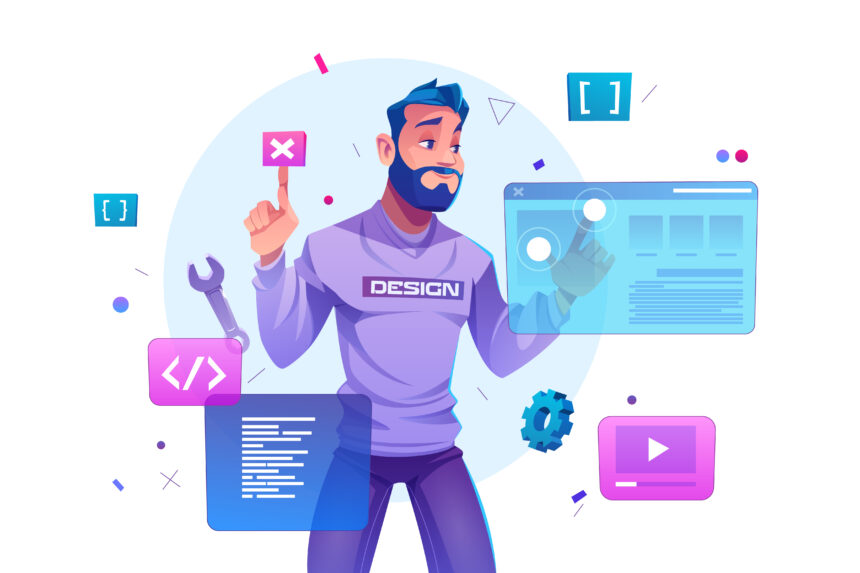Introduction: Why UX Matters More Than Ever
In today’s digital landscape, user experience (UX) is the cornerstone of successful web development. A website with poor UX is like a beautifully designed store with locked doors – it might look impressive, but no one can use it effectively.
Consider these eye-opening statistics:
- 88% of online consumers are less likely to return to a site after a bad experience (Source: Sweor)
- Every $1 invested in UX yields $100 in return (Forrester Research)
- 70% of online businesses fail due to bad usability (Baymard Institute)
This comprehensive guide will explore:
✔ What UX really means in web development
✔ The psychology behind good UX design
✔ How UX impacts conversions and revenue
✔ Essential UX principles every developer should know
✔ Common UX mistakes and how to avoid them
✔ The future of UX in an AI-driven world
Whether you’re a developer, designer, or business owner, understanding these UX fundamentals will help you create websites that engage, convert, and retain users.
1. Defining User Experience (UX) in Web Development
What Exactly is UX?
User Experience encompasses all aspects of how people interact with your website, including:
- Visual design and aesthetics
- Navigation and information architecture
- Loading speed and performance
- Content readability and organization
- Emotional response and satisfaction
UX vs UI: Understanding the Difference
While often confused, UX and UI serve different purposes:
| User Experience (UX) | User Interface (UI) |
|---|---|
| Focuses on how it works | Focuses on how it looks |
| Concerned with user flows | Concerned with visual elements |
| Involves research and testing | Involves graphic design |
| Example: Making checkout intuitive | Example: Designing button colors |
Key Insight: The best websites combine exceptional UX with beautiful UI – like Apple’s website, where stunning visuals meet effortless navigation.
2. The Business Case for UX: Why It Impacts Your Bottom Line
Conversion Rates and Revenue Impact
- Amazon found that every 100ms of latency cost them 1% in sales
- Walmart increased conversions by 200% after improving their checkout UX
- A well-designed UX can double your conversion rates (Nielsen Norman Group)
Customer Retention Benefits
- Companies with strong UX see higher customer retention rates (by 60-80%)
- 74% of users are more likely to return to mobile-friendly sites (Google)
- Good UX reduces customer support costs by up to 50%
SEO Advantages
- Google’s Core Web Vitals now directly rank sites based on UX metrics
- Pages that load in 2 seconds have 9% higher conversions than 5-second pages
- Mobile-optimized sites rank higher in search results
3. Core Principles of Effective UX Design
1. User-Centered Design
- Conduct user research (surveys, interviews)
- Create user personas (fictional representations of your audience)
- Develop user journey maps
2. Consistency is Key
- Maintain uniform design patterns (buttons, fonts, colors)
- Follow platform conventions (hamburger menu for mobile)
- Use familiar icons (magnifying glass for search)
3. Accessibility Matters
- Ensure proper color contrast (WCAG 2.1 standards)
- Add alt text to images
- Enable keyboard navigation
4. Speed Optimizations
- Compress images (WebP format)
- Minify CSS/JavaScript
- Implement lazy loading
5. Clear Information Hierarchy
- Use F-pattern or Z-pattern layouts
- Implement progressive disclosure
- Follow the “3-click rule” for important content
4. The UX Design Process: Step-by-Step
Phase 1: Research
- Competitive analysis
- User interviews
- Analytics review
Phase 2: Wireframing
- Low-fidelity sketches
- Paper prototypes
- Digital wireframes (Figma, Adobe XD)
Phase 3: Prototyping
- Interactive mockups
- Clickable prototypes
- Usability testing
Phase 4: Development
- Front-end implementation
- Continuous testing
- Performance optimization
Phase 5: Testing & Iteration
- A/B testing
- Heatmap analysis
- User feedback collection
5. Common UX Mistakes to Avoid
1. Overcomplicated Navigation
- Solution: Use mega menus for complex sites
2. Ignoring Mobile Users
- Solution: Implement responsive design
3. Poor Form Design
- Solution: Use inline validation
4. Auto-Playing Media
- Solution: Give users control
5. Hidden Contact Information
- Solution: Display prominently in header/footer
6. Measuring UX Success: Key Metrics
| Metric | What It Measures | Ideal Benchmark |
|---|---|---|
| Bounce Rate | Pages users leave immediately | <40% |
| Time on Page | Engagement level | >2 minutes |
| Conversion Rate | Goal completions | Industry-dependent |
| System Usability Scale (SUS) | Perceived usability | >68/100 |
| Net Promoter Score (NPS) | Likelihood to recommend | >50 |
7. The Future of UX in Web Development
Emerging Trends:
- Voice User Interfaces (VUIs)
- AI-Powered Personalization
- Augmented Reality Integration
- Emotion Recognition Technology
- Neumorphism Design Style
Conclusion: UX as a Competitive Advantage
In the crowded digital space, superior user experience is the ultimate differentiator. By prioritizing UX in your web development process, you’ll:
- Increase conversions and revenue
- Build brand loyalty
- Reduce development costs
- Future-proof your digital presence
Ready to improve your website’s UX? Start by:
- Auditing your current site (Google Lighthouse)
- Conducting user testing (Hotjar, UserTesting)
- Implementing gradual improvements
Remember: Great UX is invisible – when done right, users don’t notice the design, they simply enjoy the experience.
Want to Dive Deeper?
- Case Studies: How Airbnb/Amazon perfected their UX
- Industry-Specific UX Guidelines
- Advanced UX Testing Methodologies
Would you like me to expand any section with more details or examples?
